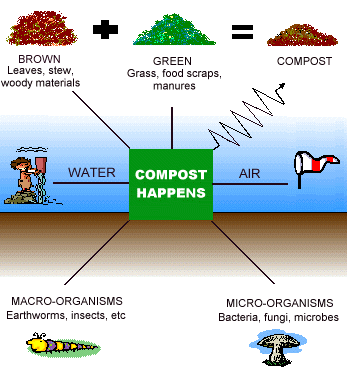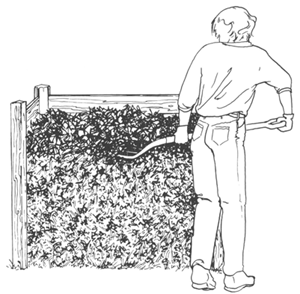Compost
Why composting?
There are many benefits to composting. Organic material makes up over 30% of the material that goes to landfills and water treatment facilities. If composting is done, this organic material is essentially recycled, removing it from the waste stream. When the amount of organic waste in an area is reduced, the life of a landfill is extended.
Composting helps improve soil quality. This has many benefits. When composting is complete, the resulting material is called humus. Humus is full of nutrients and adding it to soil greatly increases the nutrient value. This has many effects. First, nutrient rich soil leads to a greater production of agricultural crops. The crops that are grown in soil aided by composting have a better appearance. Plants will be healthier and able to fight off diseases better. Humus also keeps pests from attacking plants. This can cause a dramatic reduction in the need to use chemical fertilizers. In some cases, fertilizers can be eliminated completely. Not only does this save money for those growing the plants, but it also helps protect the environment. Composting aids in allowing soil to maintain moisture, and can be combined with clay or sandy soil to more successfully grow plants. Although there are ways to artificially provide nutrients to plants, getting the nutrients from the soil is highly preferred. This is because the soil releases the nutrients as the plant needs them. Plants grown in nutrient rich soil are also healthier to consume, as the plant retains many of the nutrients and passes them along to us when we eat them.
In cases where soil has become contaminated, compost can help remediation efforts greatly. Compost is used to treat what is known as semi-volatile or volatile organic compounds or VOCs. VOCs are found in things such as plastics, explosives, and gasoline, and are most abundant as methane. Compost can clean, or remediate, soils that have been contaminated with these items. Compost has been shown to clean over 90% of these harmful substances out of the air. Another environmental concern that compost assists in is stormwater runoff, because as it travels, it picks up heavy metals, oils, solids, grease, and other pollutants. Compost traps these harmful items and removes them from the water. It has also been used successfully in stopping erosion and silting. Not only is composting one of the best ways to help prevent pollution and cleanup contaminated resources, but it also much less expensive than traditional methods. Using compost can add up to a savings of over 50%.
Composting can save money in other ways as well. Because compost retains moisture, crops need less water. The need for pesticides and fertilizers is reduced or eliminated. It can be used in landfills as a cover. When many people in an area get involved with composting, the amount of trash sent to the landfill decreases. This allows landfills to last longer. In addition, keeping organic waste out of landfills reduces the methane gas produced. This means that less time and expense has to be spent keeping the methane under control. In certain quantities compost also can be sold, and both companies and individuals can use compost as a way to make money.
Finally, composting brings with it a sense of accomplishment that you are doing something important to help the environment. It is a simple way to make a profound difference.

Good composting isn’t only about building a good bin and correctly mixing the compost. It’s also about what you add to the compost. Here we will provide a simple outline of what you can and can’t compost.
- Consider the compost materials that will activate the heat process in your compost. Perfect heat-generating materials include: young weeds (before they develop seeds); leaves; yarrow; chicken or pigeon manure; grass cuttings; old potting soil etc.
- Items that will compost well include: fruit and vegetables; fruit and vegetable scraps; coffee grounds and tea leaves (including tea bags - remove staple if you can be bothered); vegetable plant remains; plants; cardboard & cardboard tubes (from foil wraps etc); old flowers (including dried floral displays, minus plastic/foam attachments); old straw and hay; fall (autumn) leaves; rabbit, gerbil and hamster bedding; egg shells; dead plants and weeds; hair (human, dog, cat etc.).
- Consider other items that can be composted but you may not have thought of before: paper towels; paper bags; sawdust; cotton clothing (torn up).
- Be careful of adding slow rotting items such as: tough branches, twigs and hedge clippings; wood ash; wood shavings and wood prunings. They can be composted but you may want to compost them separately due to their longer break-down time.
- Preferably avoid composting: bread, pasta, nuts, cooked food, newspaper. They don’t break down as easily and become quite slimy and can hold up the heating, rotting-down process. (Old nuts left in the garden will disappear quickly if you have squirrels or monkeys around!!)
- Never compost the following items for reasons of health, hygiene and inability to break down: meat and meat scraps; bones; fish and fish bones; plastic or synthetic fibres; oil or fat; pet faeces; weeds that have gone to seed; diseased plants; disposable diapers (nappies); glossy magazines; coal and coke ash; cat litter. These items should be removed in the normal garbage collection.
- Follow the reduce, reuse and recycle way of life to reduce the amount of things you have to end up throwing away.
